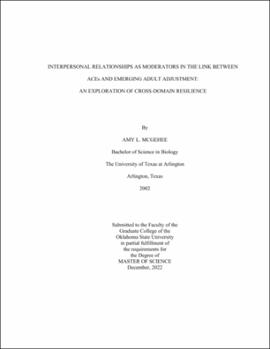| dc.contributor.advisor | Criss, Michael | |
| dc.contributor.author | McGehee, Amy L. | |
| dc.date.accessioned | 2023-08-02T19:47:14Z | |
| dc.date.available | 2023-08-02T19:47:14Z | |
| dc.date.issued | 2022-12 | |
| dc.identifier.uri | https://hdl.handle.net/11244/338798 | |
| dc.description.abstract | Well over half (58.3%) of U.S. adolescents have been exposed to at least one adverse childhood experience (ACEs), among whom 59.7% reported multiple ACEs. Research has demonstrated links between ACEs and youth physical and mental health outcomes. While evidence in the literature suggests that supportive relationships with parents, peers, and romantic partners may serve as protective factors among individuals exposed to ACEs, there have been few studies exploring whether these protective factors are applicable across outcomes or may be salient only for specific domains. The current study examined the links between ACEs and emerging adult (EA) physical and mental health outcomes (i.e., depressive symptoms, risky behavior, and health problems). It also investigated whether ACEs were uniquely related to the three outcomes when examined simultaneously. Finally, the third research goal analyzed whether supportive interpersonal relationships with parents, friends, and romantic partners moderated the links between ACEs and emerging adult physical and mental health outcomes. The sample consisted of 869 college students (Mage = 19.55, SD = 1.35; 57.8% self-identified female). Results indicated that ACEs were significantly and positively related to EA depressive symptoms, health problems, and risky behavior. In addition, high levels of ACEs were related to high levels of EA depressive symptoms and health problems (but not risky behavior) when examined simultaneously. The results demonstrated little evidence of interpersonal relationships as moderators in the links between ACEs and EA mental and physical health outcome. In a small subset of analyses that found evidence of moderation, high levels of openness and involvement magnified the link between ACEs and EA adjustment. This pattern of findings suggests that the utility and value of protective factors offered by supportive relationships may vary by context. In conclusion, social connections, such as relationships, may act as an effective means of rewiring the stress response system and promoting resilience through prosocial behavior as indicated in the literature but may only do so in the context of healthy, functional relationships. Further research is needed to understand more about the risks and protective factors among individuals exposed to ACEs. | |
| dc.format | application/pdf | |
| dc.language | en_US | |
| dc.rights | Copyright is held by the author who has granted the Oklahoma State University Library the non-exclusive right to share this material in its institutional repository. Contact Digital Library Services at lib-dls@okstate.edu or 405-744-9161 for the permission policy on the use, reproduction or distribution of this material. | |
| dc.title | Interpersonal relationships as moderators in the link between aces and emerging adult adjustment: An exploration of cross-domain resilience | |
| dc.contributor.committeeMember | Harrist, Amanda | |
| dc.contributor.committeeMember | McMaughan, Darcy Jones (DJ) | |
| dc.contributor.committeeMember | Washburn, Isaac | |
| osu.filename | McGehee_okstate_0664M_17917.pdf | |
| osu.accesstype | Open Access | |
| dc.type.genre | Thesis | |
| dc.type.material | Text | |
| dc.subject.keywords | adjustment | |
| dc.subject.keywords | adverse childhood experiences | |
| dc.subject.keywords | emerging adulthood | |
| dc.subject.keywords | interpersonal relationships | |
| dc.subject.keywords | mental health | |
| dc.subject.keywords | physical health | |
| dc.subject.keywords | protective factors | |
| thesis.degree.discipline | Human Development and Family Science | |
| thesis.degree.grantor | Oklahoma State University | |
